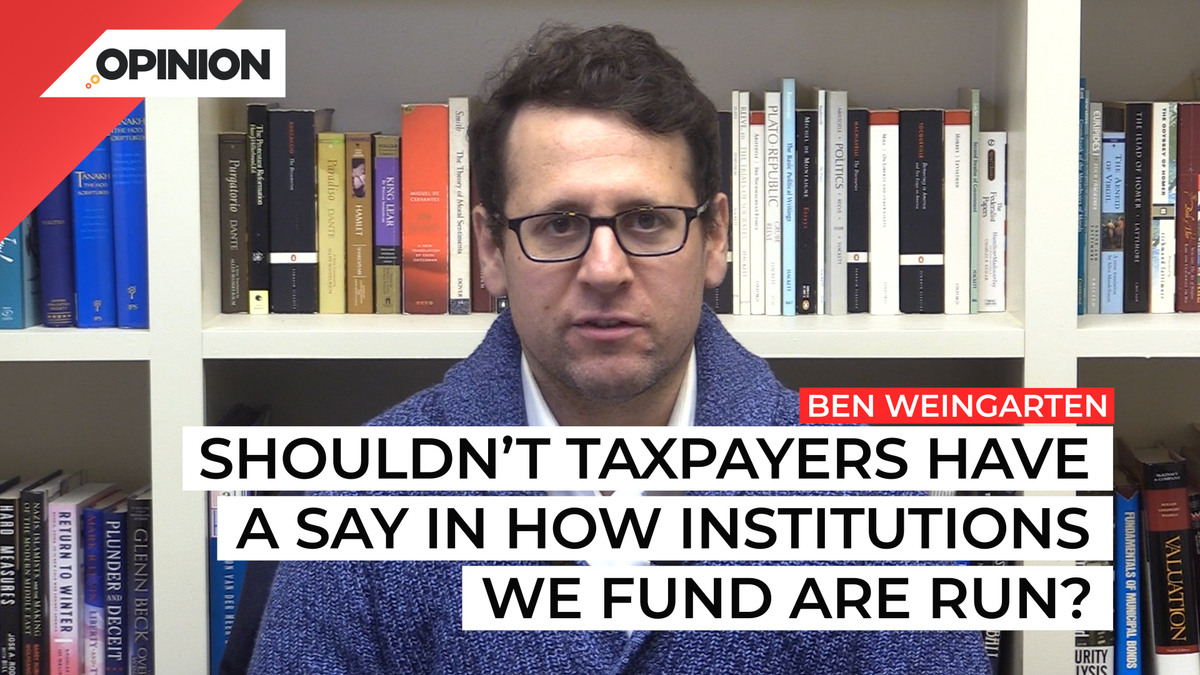
Commentary
-
Our commentary partners will help you reach your own conclusions on complex topics.
Is the right commencing a long countermarch through the very institution – the academy – where the left’s own long march began?
To see the unhinged response from the educational establishment and media over higher education reform efforts in North Carolina and Florida, one might think the countermarch is not only underway, but that it threatens progressives’ dominance over every school nationally.
At UNC-Chapel Hill, the school’s Board of Trustees recently unanimously approved a resolution calling for the development of a School of Civic Life and Leadership.
According to the Board’s Chairman, the school’s purpose “is to formalize curricula that really gives students the experience of being able to debate, share, learn and respect a diversity of viewpoints.”
DAVID BOLIEK – “We have no shortage of left-of-center, progressive views on our campus…The same really can’t be said about right-of-center views. So this is an effort to try to remedy that with the School of Life and Leadership which will provide equal opportunity for both views to be taught at the university.”
Yet this seemingly unoffensive effort has caused a controversy. Some faculty members claim to have been blindsided. They believe the trustees usurped their power in proposing the creation of the new school.
What’s more, UNC’s accreditor has questioned the legitimacy of the program on these grounds. Its president says faculty have the “role of developing the curriculum;” board members are supposed to be “eyes in, hands off.”
This criticism, and an inquiry into the trustees’ proposal, carries with it the threat UNC could be stripped of its accreditation, and with it, its federal funding.
One gets the sense critics’ beef with the trustees might be more political than procedural. UNC-Chapel Hill is a state-funded and managed school. North Carolina vested in the trustees the power to ensure the school serves the state’s interests – including “promot[ing] the sound development” of UNC, and “helping it to serve the people of the state” through advising its board of governors and chancellor — it’s all right there in the school’s Policy Manual.
As several former U.S. Department of Education officials wrote in an open letter to the trustees, “As the sole constituency on campus with a fiduciary duty to the public, not only is your board’s active engagement in university governance permissible: it is in fact your duty.”
Do the critics dispute this? Or is it that they resent any form of public control over education, particularly when exerted by those appointed by Republicans – as UNC’s Board of Trustees overwhelmingly is – who believe schools must encourage free and open discourse?
Some have expressed concern over the board’s increasing assertiveness in recent years. But shouldn’t taxpayers – through trustees – have a say in how the institutions we fund are run?
Efforts underway at Florida’s public New College, a progressive liberal arts school, are even more ambitious. There, Gov. Ron DeSantis isn’t trying to create a safe space for discourse within the school, but to remake the school in its entirety – specifically into a bastion of classical education. Imagine that? Leading that effort will be a number of new trustees – conservative intellectuals and academics appointed by the governor among them – as well as its newly-appointed president, DeSantis’s former education commissioner.
If conservative leaders can turn the struggling New School around, it could serve as the model for reclamation projects that other red state governors might emulate. As could Gov. DeSantis’ broader higher education reform plan, arguably the most sweeping such effort in the nation. The plan call for purging Florida’s public colleges and universities of “Wokeism,” rooting a core curriculum in the Western tradition, and promoting civics focused on liberty and constitutionalism.
These reforms build on past ones including a 2022 bill breaking up the “accreditation monopoly” on state schools, requiring them to seek out a new accreditor. Its old one is the same agency challenging UNC-Chapel Hill’s Board of Trustees – an accreditor that had meddled in the activities of Florida’s institutions and seemingly has an axe to grind with conservatives. The combination of hostile faculty, intrusive accreditation agencies, and relatedly the federal funds on which universities rely, are powerful forces higher education reformers must overcome.
But North Carolina and Florida’s efforts illustrate that there is a way forward. And this is what really has the educational establishment and media hysterical. If these efforts spur more widespread and aggressive ones nationally, it really could threaten leftist control over institutions – schools – so crucial to the left’s power and influence.
These efforts reflect a newfound willingness among state officials and their appointees to intervene on behalf of their constituents – to use the powers they have been granted to shape state schools in accordance with the will of their voters, challenging the “woke” ideological monoculture that prevails within them – and which has come to pervade American life.
Republicans finally realize that benign neglect of the academy – of the American mind – based in some concept of value-neutral liberalism, has proven fatal when met with illiberals who have exploited the freedom of the academy to subvert it. If we don’t cultivate a free people, beginning in our own minds, we won’t be free.
So lawmakers and their appointees have not only the right but the responsibility, to use every lever of power they can, wherever they can within state schools, to combat the divisiveness, calcification, and conformism engendered by DEI and the like, and replace it with a system rooted in the values and principles on which Western civilization, and the academy itself, is based.
-
Action required to combat anti-Jewish sentiment at elite schools
On Tuesday, April 30, student protesters took over a building on Columbia University’s main campus and demanded that the university divest from Israel, which the university has so far refused to do. This occupation at Columbia follows months of similar protests by pro-Palestinian demonstrators around the country. The occupied building, Hamilton Hall, holds a significant…
-
Biden greenlit Iranian strike on Israel
The past 30 days have witnessed tense exchanges of airstrikes between Israel and Iran, beginning with Israel’s alleged bombing of the Iranian consulate in Damascus on April 1. Iran retaliated in a widely telegraphed response designed to minimize human casualties and to provide room for de-escalation. Israel responded similarly with an even smaller second strike,…
-
Why misguided Biden is siding with Iran over Israel
The situation in the Middle East is becoming more complex, and President Biden faces a delicate situation as he seeks to prevent a broader conflict in the region. Following Iran’s unprecedented airstrikes on Israel, prompted by Israel’s alleged destruction of Iran’s consulate in Damascus, Biden asserts that he’s against participating in Israeli retaliatory strikes on…
-
Democratic voter registration scheme gains momentum
Over 158 million Americans voted in the 2020 elections, representing roughly two-thirds of all eligible U.S. voters. Despite this historic engagement, U.S. voter participation continues to lag behind that of similarly advanced democracies around the world. Straight Arrow News contributor Ben Weingarten argues that in their efforts to mobilize more voters, various U.S. organizations, including…
-
’60 Minutes’ tries but fails to tackle disinformation crisis
On March 24, “60 Minutes” published a segment examining the relationship between government authorities and private social media companies regarding the moderation of potentially dangerous content on popular social media platforms. The episode also examined how disinformation spreads, what makes social media users vulnerable to false information and how users can take steps to combat…
Latest Opinions
-
 AP Images
AP Images
EPA says San Francisco dumped billions of gallons of wastewater into ocean
-
 Getty Images
Getty Images
Bill would have immigrants reported to ICE if they illegally try to buy guns
-
 Getty Images
Getty Images
A US county is seeing success with 32-hour workweeks
-
 AP Images
AP Images
VP hopeful Kristi Noem faces further backlash for memoir yet to be released
-
 AP Images
AP Images
New EV tax credit exemption will benefit US consumers, but also China
Popular Opinions
-
In addition to the facts, we believe it’s vital to hear perspectives from all sides of the political spectrum.


